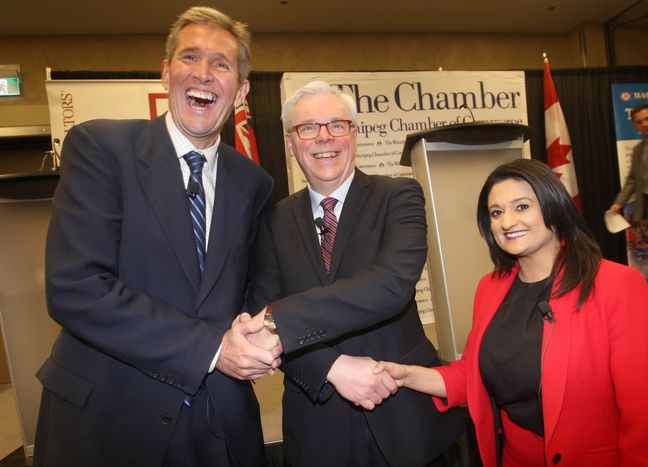Republished from the Brandon Sun print edition April 25, 2015

Manitobans have been kneedeep in hockey fever this week, consumed with whiteouts and Wheat Kings, thunder sticks and jersey-clad ministerial selfies.
And yet, while the province is — or was — consumed with hockey playoffs, the political landscape has been shifting around us.
Fresh off a federal budget that Conservatives indicate was their form of a “balanced budget,” Manitobans are poised to face their own provincial promises in a little under a week, a budget that by many accounts will feature plenty of post-election infrastructure spending and some form of the NDP’s own balanced approach.
That provincial budget on April 30 will also feature a new face, as Finance Minister Greg Dewar is poised to put his freshly purchased work boots to the test in delivering his first budget as the premier’s short-term ministerial solution. However, an examination of all things Manitoba budget is best left to discover following its unveiling next Thursday.
So for this week at least, let’s take a look at how the federal promises affect us here at home.
In rising in the House of Commons, Joe Oliver — freshly clad with his new blue runners — took the first concrete step toward the election as Conservatives throughout the country touted their government’s record on spending and their (albeit tenuous) grasp on balanced books.
As many media outlets have shared over the past number of days, the budget holds some small and somewhat limited promises as well as a shell-game approach to the aforementioned balanced funds, with the Conservatives pulling funds from rainy-day reserves to artificially balance the government books; a move sharply criticized by opposition leaders in the House of Commons.
Where many believe the government has and will continue to lose ground is in its battle for the highly coveted typical middle-class family, something both the Liberals and NDP say they most accurately represent.
Many of the current promises levelled in this budget speak well to the party’s base of support, a base that is in jeopardy should the Conservatives not provide some form of stimulus, like the highly controversial incomesplitting scenario. With all the party’s wooing of the middle class, the income-splitting scenario only benefits a very small portion of Canadians.
The ones who see the greatest benefit from the income-splitting promise are families where one member is a “bread-winner” and makes a substantial income while another is ideally a stay-athome parent. In those situations, income-splitting greatly reduces the tax burden on a family.
That’s the problem of being in a modern society — so few families, like those in our community, are in a scenario that they can afford a singleparent income. The promise of such a strategy only benefits a select, wealthy few.
Another of the promises that in the end only benefits a selected group is the increased limits on tax-free savings accounts. The Conservatives have nearly doubled the potential contribution amounts from the current $5,500 per year to $10,000.
Recent figures show the median family income in Manitoba was about $70,000 per year, but that level of income does not speak for many in a province who struggle daily to have running water or basic human services.
This promise again looks to appeal to a small portion of the population who can actually afford to contribute funds to their savings.
Lastly, the government’s promise of a balanced budget comes from a scenario where it drastically scaled back the reserve fund in the wake of shrinking revenues from the oil sector; the one entity the government hoped would buoy its fortunes moving into the next election. In an ideal scenario, the Harper Conservatives saw the oil sector continue to boom. And the ability to transfer increased revenue to balancing the books was what many had believed would bolster their fortunes in the election.
At best, the current situation presents itself as borrowing from credit cards and future hopes of prosperity to pay the bills, very similar to the provincial scenario over the last number of years.
The Conservatives have proved savvy, though, in putting together this budget as they have positioned themselves well to maintain support from their base as well as providing a few tiny nuggets for others.
But the biggest windfall may be the fact they have challenged the Liberals and the NDP to vote against a budget that shows, albeit somewhat tenuously, a balanced set of books.
For either party to completely oppose balanced budget scenarios would be at their own peril, as the resulting vote would be fodder for the Conservatives to use on the doorsteps of everyday Canadians.





Social Profiles